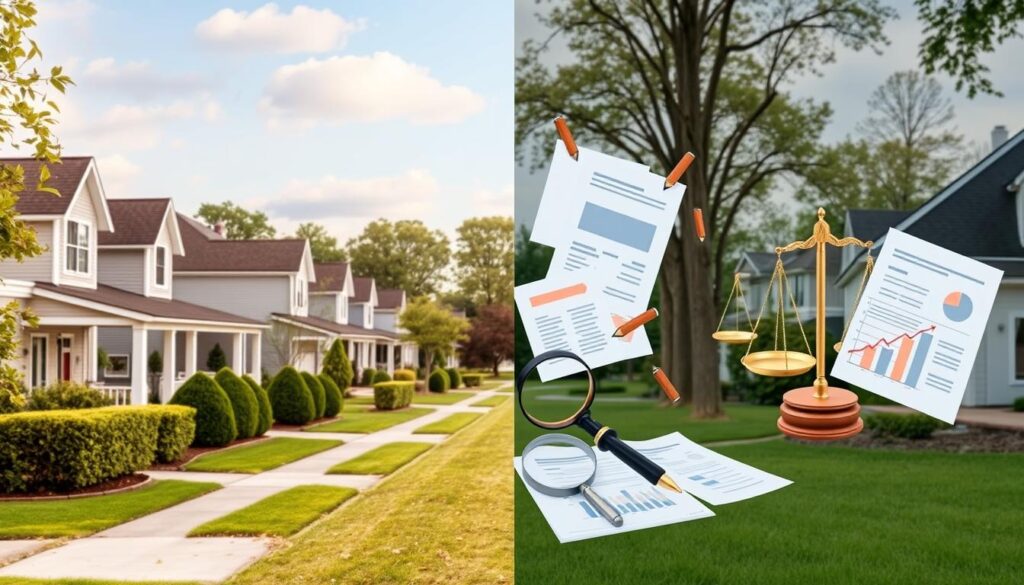Imagine standing in your yard, appreciating the comforts of home while the burden of property taxes looms overhead. For many, property tax can feel like a silent weight, consuming hard-earned dollars that could instead provide for family, savings, or dreams. Yet, within this daunting landscape lies an opportunity for tax savings that can bring relief and newfound financial freedom. Understanding how to lower property tax bills is not just valuable—it’s essential for your financial well-being. In the words of financial experts, a strategic approach to property tax reduction transforms not only your bottom line but also your peace of mind.
In places like Berkeley, property owners face an effective property tax rate close to 1.7%, meaning significant amounts can be saved with proper navigation of assessments and exemptions. For every $100,000 reduction in appraised value, homeowners can save $1,700 annually on property taxes1. This article aims to equip you with knowledge on making strategic moves, so you can embrace tax savings and feel empowered in your choices.
Key Takeaways
- Understanding property tax basics is essential for financial planning.
- Tax savings strategies can significantly reduce your overall financial burden.
- Local exemptions often provide unique opportunities for savings.
- Keen attention to property assessments helps in securing fair value.
- Staying informed on tax laws and deadlines can maximize your savings.
Understanding Property Tax Basics
Understanding the fundamentals of property tax is essential for any homeowner. This tax is primarily based on the value of your real estate, encompassing both land and structures. It serves as a crucial revenue source for local governments, funding essential services such as schools, roads, and public safety2. Property tax accounts for over 30% of total state and local tax collections in the U.S3.. As you delve into how these taxes are calculated, you’ll find that property appraisals play a significant role.
What is Property Tax?
Property tax, sometimes referred to as real estate tax, is levied on individuals and businesses that own real property. Specifically, this tax includes both the land and any structures on it. The amount you owe is determined by multiplying the local tax rate by the assessed value of your property, which can fluctuate based on market conditions2. Over 70% of local tax collections in the U.S. come from property taxes3.
How is Property Tax Calculated?
Calculating property tax involves several factors, including the local tax rate, often expressed as a millage rate, which indicates the tax owed per $1,000 of assessed property value2. For instance, certain cities, such as Rockford, Illinois, have property tax rates that can be as high as 3.04% of assessed value4. Additionally, property appraisal methods can vary widely, which can affect your tax assessment.
Important Terms to Know
- Tax Assessment: The process of determining the value of a property for tax purposes.
- Property Appraisal: An estimate of a property’s market value conducted by a qualified appraiser.
- Mill Rate: This determines how much tax you pay per $1,000 of assessed property value.
- Tax Exemptions: Specific reductions available to some property owners, such as for seniors or veterans2.

Why Property Tax Matters to You
Understanding property tax is essential for managing your finances and enhancing your home ownership experience. It influences your budget as well as the funding for local services that benefit your community. Awareness of how property taxes are structured and their impacts can lead to more informed decisions.
Impact on Your Finances
When you consider your overall budget, property tax plays a significant role. For instance, failure to pay these taxes can lead to substantial interest accrual on unpaid amounts, increasing your financial burden and possibly leading to foreclosure if the tax lien remains unresolved within a specific timeframe. Many states have high dependencies on property tax revenue; Alabama relies on property taxes for 9.8% of its total revenue, while the District of Columbia sees an astonishing 82.7% contribution from property taxes to its state revenues5.
How It Affects Home Ownership
Property tax impacts home ownership directly. Rising tax rates can affect your ability to afford your home, with homeowners benefitting from programs such as homestead exemptions which adjust the property value subject to taxation6. In states with high property tax rates, this exemption can significantly help in managing overall costs.
Funding Local Services
Local services funding is often reliant on property taxes. This funding supports essential community needs including education, public infrastructure, and public safety. A well-structured property tax system can ensure that these services are adequately financed, which in turn promotes a thriving community.

| State | Property Tax Revenue Contribution (%) |
|---|---|
| Alabama | 9.8% |
| Connecticut | 83.2% |
| District of Columbia | 82.7% |
| Alaska | 37.4% |
Understanding the nuances of property taxes helps you make wise choices regarding your finances and home ownership, ultimately benefiting both your household and your local community5. The future of services depends on informed property tax management and awareness of how it ties into the broader community framework.
Common Property Tax Exemptions
Property tax exemptions play a crucial role in alleviating the financial burden homeowners face. Various forms of these exemptions exist to help eligible individuals reduce their property tax obligations. Understanding the distinctions and qualifications related to these exemptions can enable you to maximize your savings.
Homestead Exemptions
Homestead exemptions are designed for homeowners, safeguarding a portion of the property value from taxation. In Cook County, for instance, the General Homestead Exemption can provide a maximum exemption of $10,000, while contiguous counties offer $8,000 and other counties provide $6,0007. This exemption enables homeowners to enjoy lower property tax bills.
Senior Citizen Exemptions
Senior citizen exemptions are available to older adults, often based on age or income. Such exemptions provide substantial relief for individuals aged 65 and older, with varying eligibility criteria across states8. Many seniors are able to decrease their property taxes significantly thanks to these exemptions.
Disabled Veteran Exemptions
Disabled veteran exemptions provide important financial assistance for veterans who have served in the military. In particular, the Veterans with Disabilities Exemption can offer a significant reduction on the assessed property value, with adjustments varying based on the percentage of disability7. Furthermore, many states have special exemptions tailored to disabled veterans to facilitate home ownership.
Other Possible Exemptions
Besides the previously mentioned exemptions, other potential property tax exemptions exist. These can include exemptions for properties owned by charitable organizations, those benefiting from neighborhood revitalization efforts, and various support for low-income homeowners9. Each exemption varies by region and requires specific eligibility conditions. Exploring all available options may uncover additional savings in your tax obligations.

How to Assess Your Property Tax Bill
Understanding your property tax bill assessment is crucial in managing your financial obligations as a homeowner. This requires a thorough examination of your assessment notice, comparing your property’s value with neighboring properties, and recognizing the key role local assessors play in this process.
Reviewing Your Assessment Notice
Your assessment notice outlines the assessed value of your property, which is a critical component of the property tax information you need. It’s essential to review this notice carefully. The assessed value is typically derived from the market value multiplied by an assessment ratio, and may include potential exemptions that can influence your final tax bill without changing your property’s market value10. Look out for the mill levy or tax rate mentioned to calculate your expected tax liability based on your assessed value.
Comparing Values with Neighbors
To ensure your property assessment is fair, compare it with similar properties in your neighborhood. Property taxes are influenced by certain factors like size, construction type, age, and location11. Knowing the effective property tax rates can further clarify how your property taxes measure against others; for instance, as of 2022, New Jersey’s effective property tax rate stands at 2.08%, while Hawaii enjoys a low rate of 0.26%12.
The Role of Local Assessors
Local assessors are key players in the property assessment process. They determine the value of properties in their jurisdiction and assess taxes accordingly. If you believe your assessment is incorrect, you can appeal to them directly or through formal channels, potentially showcasing recent sales data of comparable properties to back your claims11. Each local jurisdiction has specific guidelines that might influence your property’s assessed value and taxes, so staying informed about local property tax information can prove beneficial.

Strategies for Lowering Your Property Tax
Understanding how to lower your property tax can save you a significant amount of money in the long run. By following several effective strategies, you can manage your tax obligations better. Here are key approaches to consider:
Appeal Your Assessment
Many homeowners face rising property tax bills, with last year’s increases reaching as high as 30% in some areas13. If you believe the assessed value of your property does not reflect its true worth, initiating a property tax appeal is a crucial step. This process often involves gathering evidence, such as recent sales data of similar properties and assessment information from your local office.
Take Advantage of Exemptions
Homeowners can explore various exemptions that may apply to them to lower property tax bills. For instance, seniors, veterans, and those with disabilities could qualify for exemptions or tax credits14. In states like New Jersey, programs exist to provide substantial reimbursements to older adults13. Make sure to check with your local tax authority to discover available options.
Review for Errors
Accuracy in your property tax assessment is vital. Mistakes can lead to inflated tax bills. Regularly reviewing your tax card for errors and comparing your bill with similar properties in your area can help you catch discrepancies. Simple errors can often be corrected, leading to a potential tax deduction14. You may also consider requesting a revaluation if your property has not been assessed recently.

| Strategy | Description |
|---|---|
| Appeal Your Assessment | Dispute your property’s assessed value if you believe it’s incorrect. |
| Take Advantage of Exemptions | Utilize available exemptions for seniors, veterans, etc., to reduce taxable value. |
| Review for Errors | Check your tax card for mistakes and compare with neighbors to identify areas of improvement. |
Exploring these strategies can lead to a lower property tax, maximizing your financial wellbeing1413.
The Property Tax Appeal Process
Navigating the property tax appeal process can be essential for homeowners seeking to contest their tax assessments. Understanding the correct timing, required documentation, and detailed steps to submit your appeal will greatly benefit you. By knowing how to approach this process effectively, you can ensure that your property tax appeal is taken seriously.
Timing Your Appeal
Timely filing is crucial in the property tax appeal process. Taxpayers have the right to appeal the appraised value of their property during the reappraisal cycle15. The local Board of Equalization and Review typically begins its deliberations around the first week in April15. Once you receive your tax bill, you generally cannot contest that year’s assessment, which reinforces the importance of acting quickly after assessments are issued16.
Required Documentation
Gathering the necessary documentation is a key step in the appeal process. You will need to compile evidence, including your property’s record card, photos, and comparable sales data. These documents support your argument against your current tax assessment. Common reasons for appeal often involve discrepancies between assessed and actual market values or incorrect assessments based on faulty data16. Remember, the burden of proof lies with you when appealing to higher authorities, such as the State Board of Equalization and Review15.
Steps to Submit Your Appeal
Submitting your property tax appeal involves several straightforward steps. First, contact your local assessor to discuss informal appeals early in the assessment year16. If necessary, a formal appeal should be made in writing to the county board of review. Be mindful that the appeal process starts locally and can escalate to state bodies if needed16. Filing an appeal is typically free and can often be completed online, ensuring you do not need external help unless absolutely necessary17.

Resources for Property Tax Help
Finding reliable resources for property tax help can significantly ease the burden of understanding and managing your tax responsibilities. Numerous avenues are available, from local government contacts to nonprofit organizations and professional tax advisors. Leveraging these tax resources can provide you with tailored advice and essential information needed to navigate property taxes effectively.
Local Government Websites
Your local government website serves as a valuable resource for information regarding property taxes. Here, you can access crucial data about tax rates, deadlines, and assessment processes. Many counties provide useful tools for residents, including online forms and publications that outline various assistance programs. Remember, understanding your local tax regulations is vital for leveraging exemptions and determining your tax obligations.
Nonprofit Organizations
Nonprofit organizations often offer free tools and guidance regarding property taxes. These entities aim to educate residents on their rights and available exemptions, helping you make more informed decisions. They can assist in clarifying complicated tax legislation and provide workshops or seminars to help you understand key concepts of property taxation. Utilizing these tax resources can make a significant difference in your approach towards property tax management.
Professional Tax Advisors
Consulting with professional tax advisors gives you access to expert knowledge tailored to your individual circumstances. These professionals can guide you through the complexities of property tax law and help structure your appeals if you believe your assessment is incorrect. Their insights can be invaluable when determining the best strategies for reducing your tax burden while ensuring full compliance with legal requirements. Seeking help from tax advisors is an investment that may lead to greater savings in property taxes.

| Resource Type | Description | Benefits |
|---|---|---|
| Local Government Websites | Official sites providing tax-related information and forms. | Access to up-to-date rules and deadlines. |
| Nonprofit Organizations | Organizations offering free tools and resources for taxpayers. | Education on rights, exemptions, and tax law. |
| Professional Tax Advisors | Experts in tax laws guiding you through assessments. | Personalized advice that can lead to tax savings. |
Utilizing these resources effectively will empower you to manage your property taxes and navigate the associated processes confidently. Be proactive in your approach to property tax help and take full advantage of the various tax resources available1819.
How Changes in Property Value Affect Tax Rates
Fluctuations in property value can significantly impact your tax rates. Understanding the connection between market trends and your property taxes is essential for effective budgeting and financial planning. Property taxes contribute to nearly three-quarters of local tax collections, serving as a significant revenue source for financing K-12 education, public services, and community development20. These trends come into play when considering local assessments and market fluctuations.
Market Trends and Your Taxes
As property values rise due to gentrification or market demand, homeowners may see corresponding increases in their tax bills. Recent studies indicate that the Actual Value Initiative in Philadelphia resulted in increased property values and tax rates, affecting gentrifying neighborhoods20. Your local area’s tax rates and property assessments may directly reflect these market trends, influencing how much you owe.
Improvements and Their Impact
Making improvements to your home, such as adding a deck or pool, can enhance your property’s market value and lead to a hike in your property taxes21. Understanding which updates yield the highest returns can help you make informed choices about your investments. Property tax records can shed light on how your improvements may impact your tax burden.
Understanding Tax Rate Adjustments
Local governments adjust tax rates based on their financial needs. These adjustments can happen annually or follow different intervals, depending on state laws21. For instance, California’s Proposition 13 limits property tax increases, a policy that could be in flux with potential changes like Proposition 15, which advocates for differentiating between residential and commercial properties20. Monitoring these changes in local government policies is crucial to understanding how your property value can affect your tax rates.

Tax exemptions such as homestead exemptions can be beneficial in managing your overall property tax bill22. Keeping abreast of local and state tax policies will empower you in your home ownership journey.
Managing Property Taxes on Rental Properties
Understanding the complexities surrounding rental property taxes is crucial for landlords. You face unique challenges when it comes to managing these taxes effectively. The good news is there are tax deductions available that can significantly ease the financial burden associated with owning rental properties.
Unique Challenges for Landlords
As a landlord, you must navigate various tax obligations while managing your properties. Rental income is taxed as ordinary income, which falls under specific tax brackets that range from 10% to 37% for single filers, married couples filing jointly, and heads of households for both 2024 and 202523. This means it’s essential to monitor your income closely to understand how it affects your tax obligations. You might also encounter issues related to depreciation, where residential real estate is depreciated at a rate of 3.636% each year for 27.5 years, while commercial properties follow a different schedule at 39 years23.
Tax Deductions for Rental Property
Taking advantage of available tax deductions related to rental properties can significantly impact your financial outcome. You can deduct various expenses, such as advertising, maintenance, and property management fees, which help lower your taxable income. It’s also essential to report your rental income on Schedule E, Supplemental Income and Loss, and submit it with Form 1040, even for amounts that are connected to future periods24. Additionally, Section 199A of the Internal Revenue Code provides a Qualified Business Income (QBI) deduction of up to 20% for eligible taxpayers actively managing their rental properties, offering another layer of potential savings23.
Keeping Track of Rental Income and Expenses
Accurate record-keeping is vital for managing rental property taxes. You need to keep detailed records of all rental income and expenses, ensuring to report them correctly in the year they are received24. Additionally, when selling a rental property, be aware of the applicable capital gains tax rates that depend on specific income brackets, which range from 0% to higher imposed rates for single filers, married couples filing jointly, and heads of households23. Knowing these guidelines helps you prepare for the financial implications of your rental property involvement.

The Importance of Staying Informed
Staying informed about changes in property tax law and local initiatives is essential for homeowners and property owners. Knowledge of these areas can help you manage your financial obligations and make informed decisions about your real estate investments.
Keeping Up with Tax Law Changes
Property tax law changes can directly affect your tax obligations. Awareness allows you to adjust your strategies and take advantage of available exemptions or deductions. Understanding these property tax law changes helps you stay compliant with local regulations and avoid penalties25. Periodic evaluations of properties ensure that assessments reflect fair market value, which is crucial for accurate taxation25. Furthermore, local real estate news can help you identify updates regarding these laws and how they may affect your property taxes26.
Staying Aware of Local Initiatives
Local initiatives can significantly impact property values and tax assessments. For example, new developments or community projects in your area may increase property values, affecting your property tax bill26. By staying aware of such initiatives, you can make informed decisions and potentially benefit from increases in property equity. Additionally, understanding the dynamics of buyer’s and seller’s markets can influence your investment strategies26.
Resources for Ongoing Education
Utilizing various resources will empower you to remain informed. Local government websites typically provide information on property tax laws and upcoming initiatives. Nonprofit organizations and professional tax advisors are also valuable sources for advice and guidance. Seeking professional advice can help you manage your property tax filings effectively, potentially reducing your financial burden27. Access to real estate news outlets that track recent sales and market trends will keep you updated on the factors affecting your tax assessments26.

The Future of Property Taxes
The landscape of property taxes is poised for evolution driven by various economic trends and homeowner predictions. As property values and market conditions fluctuate, understanding future changes in property taxes becomes essential for homeowners across the country.
Potential Changes on the Horizon
Recent analyses illustrate that property values in the U.S. have risen almost 27 percent faster than inflation since 202028. Consequently, this significant increase appears to be impacting property tax collections significantly. States like California and Texas are examples where varying property tax systems interact closely with rising home prices. California’s median home price stands at $660,000, while Texas’s median is considerably lower at $240,00029. Increased property values mandate a careful evaluation of tax structures to avoid overburdening homeowners, particularly in high-cost areas.
Impact of Economic Trends
Property taxes are the largest source of state and local revenue in the U.S. and thus highly sensitive to economic conditions28. The future of property taxes may reflect shifts in local economies, necessitating that homeowners remain informed. For instance, property taxes accounted for almost 17% of the average American housing budget in 2021 for homeowners with a mortgage, revealing the significant financial weight these taxes exert29. As local governments strive for financial stability, homeowners can expect potential tax adjustments in tandem with fluctuations in the housing market.
Predictions for Homeowners
Looking ahead, homeowner predictions must address how economic realities can reshape property tax obligations. States exhibiting lower median property taxes, such as West Virginia and Alabama, present a stark contrast to higher-tax states like New Jersey, where median taxes reached $8,498 in 202330. Homeowners may face an environment where tax rates continue to rise; median property taxes for all properties in 2023 climbed to $2,826, a notable increase of $539 from 201930. Understanding these trends will empower homeowners to plan effectively for potential increases in their financial responsibilities.

How Technology is Changing Property Tax Management
Technology is revolutionizing property tax management by providing innovative solutions that streamline processes, improve accuracy, and enhance overall efficiency. Property tax management apps and online tools are critical for individuals and organizations alike, assisting in navigating the complexities of property tax compliance.
Online Assessment Tools
Online assessment tools are now available to help users quickly evaluate property values and tax implications. By integrating these tools, property owners can undertake assessments without heavy reliance on offline methods, significantly reducing the risk of errors. With the rapid adoption of property tax technology, many firms experience enhanced audit readiness, as outdated manual processes are increasingly being replaced with automated solutions31. This transition not only boosts accuracy but also minimizes the time taken to file, which is vital considering property tax compliance is an annual exercise involving extensive data31.
Using Apps for Property Tracking
The rise of property tax management apps facilitates tracking property values and tax responsibilities effortlessly. For instance, CoreLogic manages over 80% of the nation’s residential escrow payments, showcasing the significant role technology plays in financial responsibilities associated with property ownership32. Implementing these apps equips users with the tools needed for effective management, ensuring they maintain compliance and stay updated on deadlines.
Resources for Simplifying Payments
Utilizing technology, property owners can access a variety of resources designed to simplify payment processes. Systems like CoreLogic’s DigitalTax Tru-Pay significantly reduce payment processing timelines from days or weeks to mere minutes, improving the overall user experience32. Front-loading investments into research and adopting best practices in property tax technology can foster successful implementation efforts, demonstrating the long-term benefits these resources provide31.

| Technology Tool | Benefits | Impact on Management |
|---|---|---|
| Online Assessment Tools | Increased accuracy and efficiency | Reduced errors and improved audit readiness |
| Property Tax Management Apps | Easy tracking of property values | Streamlined compliance and responsibility management |
| Payment Solutions | Faster processing times | Enhanced user experience and timely payments |
Tips for First-Time Homebuyers
As a first-time homebuyer, navigating the complexities of property taxes can be daunting. Understanding property tax rates and planning for future increases are crucial steps in ensuring your financial readiness. This section offers valuable home buying tips to help you make informed decisions.
Understanding Property Tax Rates
Property tax rates vary significantly based on your home’s location and its assessed value. Homeowners may experience taxes that support essential services, with annual assessments typically conducted by local authorities. First-time homebuyers should expect property tax obligations to be included in their monthly mortgage payments, factoring into their overall housing costs. Federal tax laws allow up to $10,000 in property tax deductions for primary and vacation homes, making it important to consider these aspects during your home search33.
Asking the Right Questions
During the home buying process, asking the right questions can make a substantial difference. Inquire about local property tax rates and the history of tax increases in the neighborhood. Understanding how the taxes fund local services like schools and firefighters can inform your decision. Additionally, determine if there are exemptions available that may reduce your overall property tax burden, especially for first-time homebuyers34.
Planning for Future Increases
Property tax rates can change, impacting your long-term financial plans. First-time homebuyers should budget for potential property tax increases, which often correlate with home value appreciation. Preparing for these fluctuations is essential to maintain financial stability. Consider setting up an escrow account with your lender to help cover annual property taxes and insurance premiums35.

Avoiding Common Property Tax Mistakes
Staying vigilant about your property tax responsibilities is crucial for minimizing liabilities. Many homeowners encounter common property tax mistakes that can lead to unexpected financial strains. Understanding how to avoid mistakes related to assessments, deadlines, and exemptions can save you money and keep your finances secure.
Ignoring Your Assessment
Failure to review your property assessment can have significant consequences. When property tax assessors place incorrect values on assets, it often leads to overpayment. Exercising the right to appeal an incorrect assessment helps avoid ongoing overpayment and can be crucial in minimizing overall tax liabilities36. Access to tools like Property Tax Plus can assist you in tracking important deadlines for appeals, thereby ensuring you do not overlook necessary actions36.
Missing Deadlines
Missing property tax payment deadlines can result in costly penalties and interest charges37. Staying informed about these crucial dates is essential for maintaining a healthy financial status. To prevent financial strain, consider applying for payment plans with local tax offices, especially if you anticipate difficulties in making lump-sum payments37. Additionally, splitting your direct rental income deposits to set aside funds for property taxes can be a useful strategy to help manage these obligations effectively.
Misunderstanding Exemptions
Failing to recognize available property tax exemptions can lead to unnecessary additional costs36. Numerous states offer specific exemptions that can significantly decrease your property tax burden. Missing out on these might result in higher tax payments than necessary. It is vital to stay updated on regional exemptions and incentives to maximize savings effectively37. For example, certain states provide freeport exemptions for qualifying inventory, which can be a boon for qualifying businesses38.

Planning for Property Tax Payments
Managing property tax payments can seem daunting, but with a well-structured approach, you can tackle it effectively. Developing payment strategies will help ensure you meet your obligations while planning for future increases. Understanding due dates is critical; being aware of when your payments are due can prevent costly penalties.
Setting Up Payment Strategies
Establishing a reliable payment strategy is crucial for successful property tax management. Consider enrolling in installment plans if eligible, which allow you to break down your total tax bill into smaller, more manageable monthly installments. This can be particularly beneficial for those facing budget constraints, allowing for more effective budgeting for taxes over the year.
Understanding Due Dates
It’s important to know that property tax payments in Philadelphia are due on March 31, with bills usually mailed in December39. Penalties for late payments accrue at a rate of 1.5% per month after April 1, compounding the total owed39. Ensuring you stay informed about these dates can prevent the stress and expense of missed payments.
Budgeting for Increases
As property taxes can change from year to year, it’s prudent to budget for potential increases. For 2025, the Real Estate Tax rate in Philadelphia is set at 1.3998%39. This means homeowners should anticipate fluctuations in their property tax payments over time. Keeping track of your income, determining eligibility for assistance programs, and planning for any potential increases will help you maintain financial stability.

Final Thoughts on Your Property Tax Journey
As you navigate your property tax journey, taking action today is crucial in ensuring you remain proactive about your financial responsibilities. Whether it’s appealing your property assessment, taking advantage of exemptions, or staying informed about local tax laws, each decision you make can greatly influence your financial management strategy. Start leveraging the knowledge and resources you’ve gathered to empower yourself in making informed decisions.
Take Action Today
It’s essential to recognize that the landscape of property taxes is dynamic, with recent legislative changes and market trends affecting homeowners across the U.S. In Wyoming, for instance, several bills have been introduced to help manage skyrocketing property taxes, highlighting the importance of community awareness and involvement in your local governance40. Such knowledge enables you to make choices that can significantly impact your overall property tax burden.
Make Informed Decisions
Being well-informed also means understanding historical and current market values. For example, homes in areas like San Francisco experienced price reductions recently, suggesting the need for careful evaluation of your property against market trends41. You can utilize available data to set expectations and negotiate better outcomes in your property dealings.
Keep Your Finances in Check
Ultimately, effective management of your property taxes is a continual process. Regularly assessing your financial situation and the assessed value of your property can help ensure that you do not overpay42. By staying diligent and proactive, you can keep your finances in check, thereby optimizing your overall investment in homeownership.
FAQ
What is property tax?
How do I calculate my property tax?
What are some common property tax exemptions?
How can I appeal my property tax assessment?
What is a tax appraisal?
How often are property assessments conducted?
Are there technology tools available to manage property tax responsibilities?
How do property tax deductions benefit me?
What should first-time homebuyers know about property tax?
What are the consequences of missing a property tax payment?
Source Links
- https://www.meganmicco.com/blog/unlocking-property-tax-savings/ – Unlocking Property Tax Savings – Megan Micco – Berkeley Real Estate Expert
- https://www.rocketmortgage.com/learn/property-tax – What Is Property Tax And How To Calculate It
- https://taxfoundation.org/taxedu/glossary/property-tax/ – What is a Property Tax?
- https://www.investopedia.com/terms/p/propertytax.asp – Property Tax: Definition, What It’s Used for, and How It’s Calculated
- https://www.nar.realtor/blogs/economists-outlook/the-importance-of-paying-property-taxes – The Importance of Paying Property Taxes
- https://www.habitat.org/costofhome/why-they-matter-property-tax-relief-programs – Why they matter: Property tax relief programs
- https://tax.illinois.gov/localgovernments/property/taxrelief.html – Property Tax Exemptions
- https://www.rocketmortgage.com/learn/property-tax-exemptions – Property Tax Exemptions: Seniors, Veterans And Others Who Qualify
- https://www.michigan.gov/taxes/property/exemptions – Property Tax Exemptions
- https://www.avalara.com/blog/en/north-america/2023/02/your-tax-assessment-vs-property-tax-whats-the-difference.html – What’s the difference between property tax and a tax assessment?
- https://www.investopedia.com/financial-edge/0610/your-property-tax-assessment-what-does-it-mean.aspx – Your Property Tax Assessment: What Does It Mean?
- https://www.investopedia.com/articles/tax/09/calculate-property-tax.asp – Property Taxes: How They Are Calculated and Ranking by State
- https://www.kiplinger.com/taxes/how-to-lower-your-property-tax – How to Reduce Your Property Tax
- https://www.experian.com/blogs/ask-experian/how-to-reduce-property-taxes/ – How Do I Reduce My Property Taxes? – Experian
- https://www.ncdor.gov/taxes-forms/property-tax/property-tax-appeal-process – Property Tax Appeal Process | NCDOR
- https://tax.illinois.gov/localgovernments/property/appeals.html – Assessment Appeals – Property Tax
- https://www.cookcountyassessor.com/appeals – Overview of How Appeals Work
- https://dor.georgia.gov/property-tax-faq-real-personal-property – Property Tax FAQ – Real & Personal Property
- https://dor.georgia.gov/2023-property-tax-relief-grant – 2023 Property Tax Relief Grant
- https://www.urban.org/urban-wire/understanding-impact-property-taxes-critical-effective-local-policymaking – Understanding the Impact of Property Taxes Is Critical for Effective Local Policymaking
- https://www.investopedia.com/articles/pf/07/property_tax_tips.asp – 8 Tips for Lowering Your Property Tax Bill
- https://www.quickenloans.com/learn/property-tax-increase – Why Do Property Taxes Go Up? What To Know | Quicken Loans
- https://www.investopedia.com/rental-real-estate-taxes-5211939 – Rental Real Estate Taxes: What Happens When You Own or Sell
- https://turbotax.intuit.com/tax-tips/rental-property/real-estate-tax-and-rental-property/L3e09vT71 – Rental Real Estate and Taxes
- https://www.capitaltax.com/property-tax-filings/navigating-property-tax-filings:-who-should-consider-them-and-why – Navigating Property Tax Filings: Who Should Consider Them And Why
- https://teamfallico.com/blog/local-real-estate-news-staying-informed-for-informed-decisions/ – Local Real Estate News: Staying Informed for Informed Decisions | Team Fallico
- https://fastercapital.com/topics/the-importance-of-staying-informed-on-tax-regulations.html – The Importance Of Staying Informed On Tax Regulations – FasterCapital
- https://taxfoundation.org/research/all/state/property-tax-relief-reform-options/ – Confronting the New Property Tax Revolt
- https://www.minneapolisfed.org/article/2024/how-higher-property-taxes-increase-home-affordability – How higher property taxes increase home affordability | Federal Reserve Bank of Minneapolis
- https://www.corelogic.com/intelligence/property-taxes-balloon-after-pandemic-home-price-gains/ – Property Taxes Balloon After Exuberant Pandemic-Era Home Price Gains
- https://www2.deloitte.com/us/en/pages/tax/articles/technology-and-property-tax-lifecycle.html – Technology and Property Tax Lifecycle
- https://www.housingwire.com/articles/how-the-core-logic-advantage-enhances-property-tax-management/ – How the CoreLogic Advantage enhances property tax management
- https://www.equifax.com/personal/education/personal-finance/articles/-/learn/tax-credits-for-first-time-buyers/ – Tax Credits for First-Time Home Buyers & How to Qualify | Equifax
- https://www.harnesswealth.com/articles/homebuyer-financial-and-tax-planning-guide/ – First-Time Homebuyer Guide: Financial Planning Tips and Tax Benefits of Buying a House
- https://sffirecu.org/learning/10-tips-for-a-first-time-home-buyer-in-the-bay-area/ – 10 Tips for a First Time Home Buyer in the Bay Area – SF Fire Credit Union
- https://propertytax-plus.com/understanding-and-avoiding-common-property-tax-mistakes/ – The Hidden Superpowers of Property Tax Software:…
- https://www.hegwoodgroup.com/avoiding-audits-and-common-property-tax-mistakes/ – Avoiding Audits and Common Property Tax Mistakes | Hegwood Group
- https://www.allynintl.com/news-publications/entry/top-five-mistakes-to-avoid-in-property-tax – Top Five Mistakes to Avoid in Property Tax
- https://www.phila.gov/services/payments-assistance-taxes/taxes/property-and-real-estate-taxes/real-estate-tax/ – Real Estate Tax | Services
- https://www.pewtrusts.org/en/research-and-analysis/articles/2024/04/25/as-property-tax-bills-rise-states-look-for-long-term-solutions – As Property Tax Bills Rise, States Look for Long-Term Solutions
- https://www.financialsamurai.com/fighting-my-property-taxes-and-losing/ – Fighting My Property Taxes And Losing: Key Lessons For Battle
- https://www.capitaltax.com/real-estate-tax-planning/real-estate-tax-planning-101:-a-comprehensive-guide-for-beginners – Real Estate Tax Planning 101: A Comprehensive Guide For Beginners








